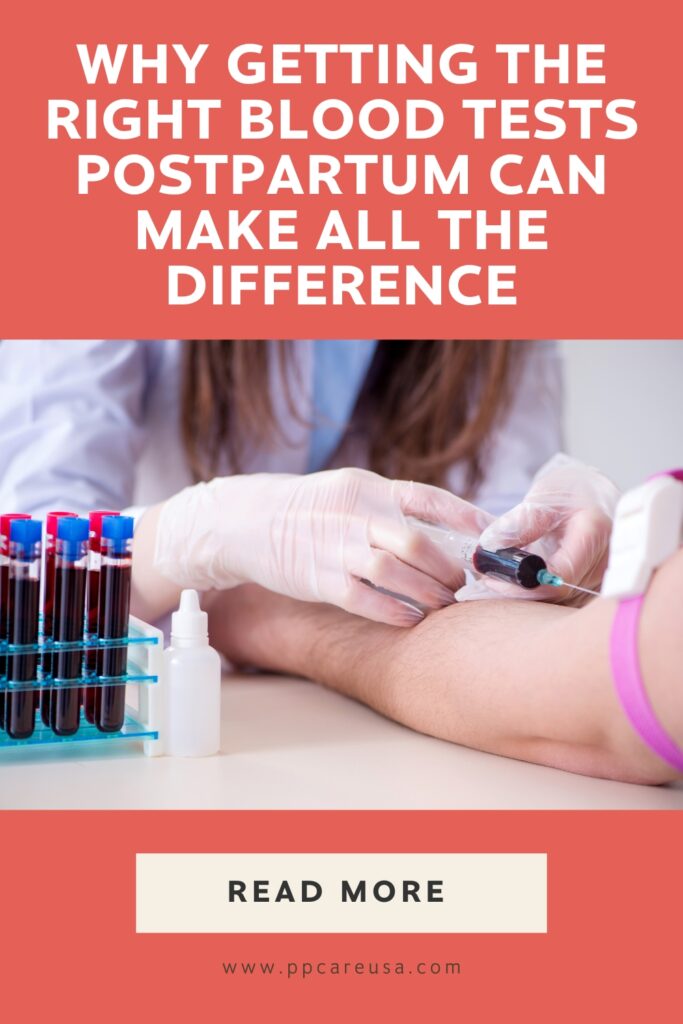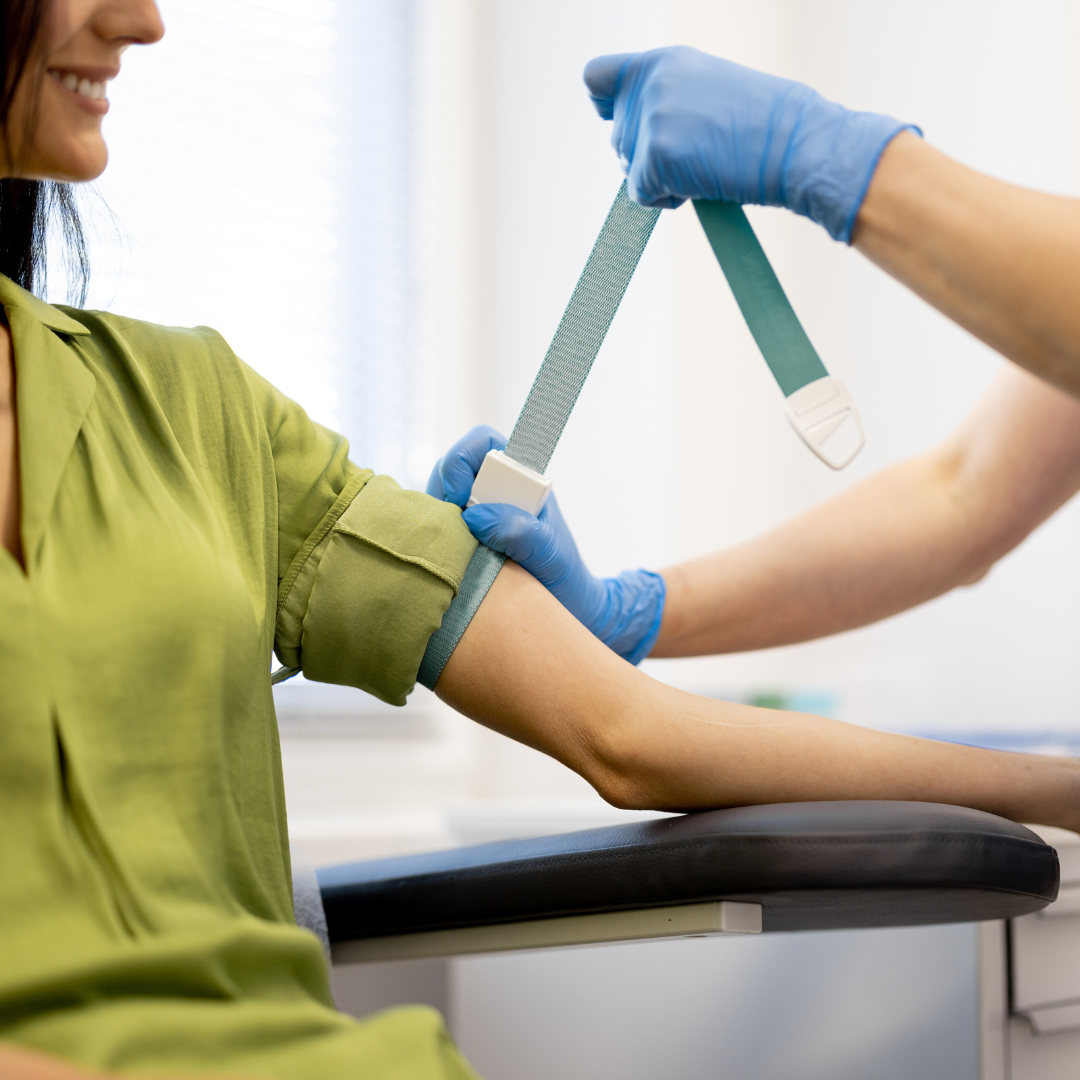Mama, the postpartum labs you truly need will likely not be drawn by your PCP or OBGYN.
That’s because typical postpartum care in the United States involves one quick visit with your OBGYN at 6 weeks postpartum, a basic anxiety & depression screening once, and general reassurance that your postpartum symptoms are “normal.”
Why Getting the Right Blood Tests Postpartum Can Make All the Difference
At Postpartum Care USA, we believe in holistic and comprehensive postpartum care. This includes full nutrition, inflammation, thyroid, and metabolic panels, in-depth analysis to identify deficiencies and imbalances, and personalized care plans tailored to your unique needs.
Your PCP and OBGYN might tell you everything’s ‘normal,’ but they’re not drawing the labs you actually need postpartum…so how do they know?
If you’ve been dealing with anxiety, exhaustion, insomnia, low libido, hair loss, depression, irritability, or any combination of these symptoms, it’s important to have the right blood tests to determine the root cause.
Some healthcare providers will either brush off your symptoms as “part of being a mom” and jump to put you on birth control or anti-anxiety medication, this is a quick fix and not a long-term solution.
Getting the right lab work done after having a baby can give you information about what’s really going on in your body so that you can give your body the right nutrition and hormonal support it needs to function properly.
Let’s break down the postpartum labs you really need to get back to your vibrant self!
What labs should you have done postpartum?
Unfortunately, testing hormone levels and electrolytes in the postpartum period is not commonly ordered by physicians at your 6-week appointment. Here’s 5 labs we recommend for nearly every mama:
Complete Blood Count
A Full or Complete Blood Count (FBC or CBC) is an essential test that evaluates red and white blood cells as well as platelets. This is typically ordered the day after you deliver your baby in the hospital setting but not again until you go in for your annual check-up (if that).
The CBC provides insights into potential deficiencies in iron, B12, and folate, while also assessing hydration levels, oxidative stress, immune function, and inflammation.
This test is particularly useful for addressing symptoms such as fatigue, poor concentration, and issues related to energy production.
Iron Levels
Postpartum iron studies are another critical assessment, especially during the postpartum period when iron levels may be depleted due to the high demands of pregnancy, postpartum bleeding, and lactation.
This test includes measurements of serum iron, ferritin, transferrin, and transferrin saturation, helping to pinpoint the cause of symptoms like fatigue, dizziness, brain fog, and shortness of breath.
Thyroid Function Test
The Thyroid Function Test evaluates thyroid health and is especially important for identifying postpartum thyroiditis (PT), which can significantly affect metabolism and mood. A full thyroid panel, including TSH, free T4, and free T3, is recommended to gain a complete picture.
This test is particularly valuable for understanding symptoms like anxiety, fatigue, brain fog, hair loss, and sensitivity to temperature changes.
Fasting Insulin Levels
A Fasting Insulin test assesses blood sugar regulation and helps identify early signs of insulin resistance.
This test is often more indicative of blood sugar imbalances than fasting glucose levels and is essential for addressing symptoms such as fatigue, irritability, brain fog, disrupted sleep, and menstrual irregularities.
Vitamin D Levels
Finally, a Vitamin D test is crucial for evaluating levels of this important nutrient, which supports mood, blood sugar regulation, immune function, hormone balance, and tissue healing.
For breastfeeding mothers, maintaining adequate vitamin D levels is particularly important, as low maternal levels can lead to insufficient transfer to breastmilk, potentially affecting the baby’s health.
Additional tests that may be beneficial include thyroid antibodies for abnormal thyroid results, vitamin B12 and folate for issues related to energy, mood, and cognition, and electrolytes to assess hydration and fluid balance.
Other Postpartum Labs You May Need
Every mother’s postpartum journey is unique, meaning the blood tests that are most beneficial for one mom may not be the same for another. In addition to the core tests, other blood tests can provide valuable insights based on individual symptoms and health concerns:
- Thyroid antibodies may be recommended if thyroid function test results are abnormal, particularly when postpartum thyroiditis is suspected.
- Vitamin B12 and folate levels are important to check for mothers experiencing low energy, mood changes, or cognitive issues, especially if a full blood count indicates possible deficiencies.
- An electrolyte panel offers a comprehensive view of kidney function, electrolyte and mineral levels, protein balance, and inflammation markers. This is a versatile test that can reveal a range of health insights when interpreted correctly.
- Plasma zinc levels can be affected postpartum as zinc, like iron, is heavily utilized by the baby during the final trimester of pregnancy. Zinc is crucial for mood, sleep, hormone balance, digestion, immunity, and skin health, making it a key nutrient to monitor.
- Cortisol and DHEA levels, which measure stress hormone production by the adrenal glands, can be especially useful for mothers experiencing exhaustion, anxiety, sleep disturbances, or burnout.
These additional tests can provide a deeper understanding of a mother’s postpartum health and help guide personalized care.
How to Get Labs for Postpartum Symptoms
Even though postpartum symptoms like fatigue, anxiety, low libido, and brain fog are common, this is absolutely not normal and can be treated! It’s not in your head, and it’s not just ‘new mom life.’ It’s your body screaming for help.
Every mama is different in how their body recovers after having a baby and this is not a comprehensive list of the tests that you may need to get the answers you need for your postpartum symptoms.
Don’t let anyone tell you ‘it’ll get better’ without actually checking what’s going on inside your body.
If you’re tired of feeling ignored, it’s time to take control of your health and get those labs done right. Reach out by filling out our contact form, messaging us on Instagram, or schedule your New Mama Virtual Health Assessment here.
During this initial consultation, we’ll review your symptoms and come up with a personalized plan specific to your needs.
You deserve real answers, not brushed-off symptoms. Normal does not mean “optimal” and that’s what we want for you!
Pin This for Later:



Postnatal Depletion
Meet the Team
Our Services
Supplements
A virtual healthcare clinic that helps postpartum mamas recover from postnatal depletion syndrome with a holistic approach.

Get in touch